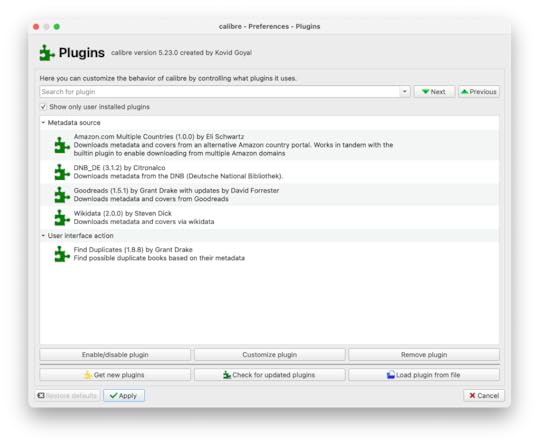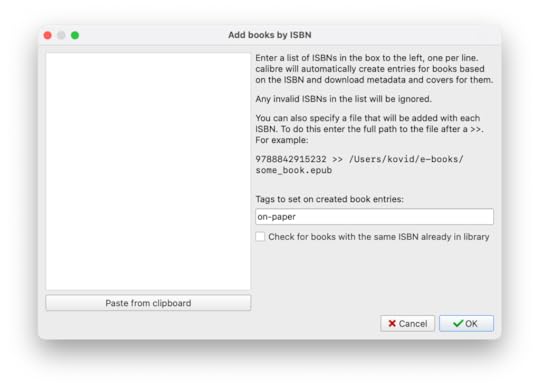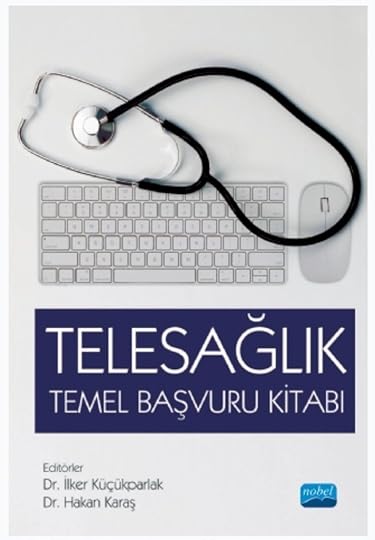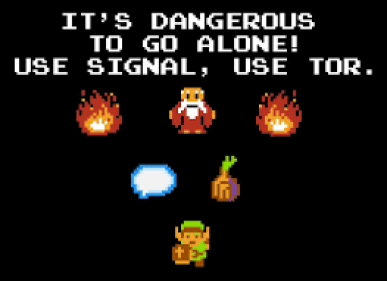Ahmet Alphan Sabancı's Blog, page 3
July 13, 2021
Adventures in Building a Library Catalog
Some time ago, I wrote about the problems with Goodreads and how StoryGraph can be a good alternative for many. This is something I’m really interested because most of what I do is about books and because of my ADHD brain, not being able to track the books I have causes quite unique problems such as having multiple copies of the same book, sometimes in different languages.
Thanks to my ADHD now I have the English e-book edition and the Turkish print edition of the same book.
— Ahmet Alphan Sabancı (@ahmetasabanci) July 7, 2021
This is why one of my major quests in life is having a personal library catalog in which I can track what I have. But this is not an easy task.
Chapter One: StorygraphAlthough Storygraph seemed like a good alternative with many promising options, there were many problems which made it really hard to use. The most important one was the issues with finding and adding Turkish books. Most of them were not available and some were only returning the results for English editions. Which is a huge problem because if I’m going to keep track of my books and my library, I have to make sure the correct editions are logged.
Another important issue was the limits of its social aspect. There’s no way to know if someone I know is on the platform unless they tell you. There’s no easy way to find people, no way of communicating, etc. Since I was also trying it as a Goodreads alternative, this was an important issue for me. Because I really like seeing which books other people are reading and what they think about it.
Missing the social side plus not being able to track books in Turkish simply made Storygraph a bad choice for me. I had to move on.
Chapter Two: LibraryThingThen I tried to give LibraryThing a shot. It seems old school and not really sure how many people actively uses it, but it seemed like a better place to keep a library catalog because of the power tools such as scanning book barcodes with the iOS app.
At first, LibraryThing was working just fine, until I’ve decided to start adding my library at home to have a catalog I can easily search. Although LibraryThing can search the university libraries in Turkey, most of the data was either incorrect or totally missing. Yes, it was finding most of the books, but occasionally the names were wrong, sometimes the authors. Some books had Turkish character issues in their names, some showed the translator as the main author, some had completely unrelated information.
This is why I’ve returned to using Goodreads for the online and social part of the book tracking adventure. But Goodreads also has issues about Turkish book data, even though much less than the other options. Those issues mainly caused by volunteer librarians on the platform, and although I’m one of them, I don’t have the time to track every issue and fix it.
This means I still need a solution for building my library catalog. That’s when I decided to give an old friend a chance.
Chapter Three: Calibre, The Old ReliableFor those who don’t know, Calibre is a digital library software that’s mainly used for organizing your e-book library. It also has so many power tools and plugins inside, which makes it a crazy powerful software. I’ve been using it to organize my e-books for years, but it never occurred to me that I can use it for more. Until now.
You can simply use Calibre as it is, and it’ll probably work just fine but if you want to make sure that it can find anything, you can go to add-ons and search for these extensions too:
 The list: Amazon.com Multiple Countries, DNB_DE, Goodreads, Wikidata, Find Duplicates.
The list: Amazon.com Multiple Countries, DNB_DE, Goodreads, Wikidata, Find Duplicates.After this, all you have to do is expand the Add Books menu and select “Add Books by ISBN”. This screen will open, and you can add as many ISBNs as you want and let Calibre do its thing. If you need an easy way to separate e-books from paper ones, you can simply add a tag like I did and all the books will have this tag automatically added.

Now I can keep track of my library in one place and easily add more books whenever I buy new ones. All I have to do, write the ISBNs on my phone and then paste them inside the Calibre. While other solutions had dozens of missing books or books with incorrect information, Calibre only had two missing ones: one of them published a couple of weeks ago and one published by a small publisher. All I had to do, copy and paste book info from the publisher websites, and it was done.
ConclusionSo, this is where I ended up:
Calibre will be the tool to keep track of our household library for everything, e-books and dead-tree ones. I wish I could find a way to simply turn that into a one-person book blog, but until I have enough time to give it a shot, it’s a dream project waiting in my notes.
For a more public facing book tracking, I’ll keep using Goodreads. But I’m thinking about other alternatives too. Maybe creating a special category on my blog and write small posts every time I finish one. I’m not sure about it yet.
This experience taught me a lot about platforms, books, ISBNs and many other things. But one common thread I’ve been facing in many online tools is how Western —and sometimes simply US— centric those tools and projects were. I can easily use many tools as long as I keep everything limited with English and/or US-based. When you step outside English, you’re on your own. Nothing fully works and most of the time you have to figure out the problems you face by yourself because most of those were never occurred to the developers or not seemed urgent.
We always talk about how internet is global and open for everyone in the world, as long as you live in English. And it will seem mostly true if you’re in the US, UK, or some other Western country (although the same problems may be faced by Europeans or people in the US who doesn’t speak English). But when you try to work with another language, even if you’re using a global standart like ISBN, things change quickly.
If the global internet starts throwing bugs at your face when you’re trying to work with a global standart, think about what kind of problems people are facing regularly when it comes to more serious issues such as content moderation.
June 18, 2021
Videokonferans Teknolojileri – Telesağlık Temel Başvuru Kitabı

Telesağlık; çevrim içi (online), telefon ya da başka bir iletişim yöntemi ile sağlık hizmetini uzaktan sağlamak anlamına gelmektedir.
Kitabı; öncelikle farklı tıp uzmanlıklarında telesağlıkla ilgili literatür bilgisini derlemektedir. Bunun yanı sıra diş hekimleri, hemşireler, fizyoterapistler, ilk ve acil yardım teknikerleri, radyoloji teknikerleri, patoloji teknikerleri gibi sağlık çalışanlarının da kendi alanlarıyla ilgili telesağlık bölümlerini kapsayan bütüncül bir içeriğe sahiptir.
Bu kitabın sadece farklı alanlardaki literatür bilgisini derlemekle kalmayıp yazarların konuya ilişkin uzman görüşlerini de kapsaması ve ayrıca etik, hukuk, videokonferans teknolojisi ve ses ve görüntü rejimi gibi telesağlık için işe dönük müstakil bölüm içerikleri ile uygulayıcılar için bir rehber niteliği görmesi amaçlanmıştır. Böylelikle okuyucu, videokonferans görüşmesinde kadraj nasıl ayarlanmalı sorusundan telesağlık için aydınlatılmış onam hazırlamaya kadar uygulamada ihtiyaç duyacağı pek çok konuya erişme olanağı bulacaktır.
Son olarak afet, denizcilik ve havacılık gibi özel durumlaraki telesağlık uygulamalarına ayrılan müstakil bölümler, telesağlık uygulamalarının heterojen yapısı düşünüldüğünde kitabın olabildiğince kapsayıcı bir içeriğe sahip olmasını sağlamıştır.
Kitap; tıp doktorları, diş hekimleri, hemşireler, fizyoterapistler, sağlık teknisyenleri, sağlık idarecileri, sağlık girişimcileri ve bu bölümlerin öğrencileri için önerilir.
Yayınevinin tanıtım yazısından
Pandeminin hayatımızda yarattığı en büyük dönüşümlerden birisi, teknolojiyi ve dijital iletişim araçlarını hayatımızın birçok alanına beklemediğimiz bir hızda entegre etmek zorunda kalmamız oldu. Her ne kadar telesağlık alanı uzun zamandır gelişmekte olsa da pandemi gibi bir aciliyet durumu yaşanmadığından dolayı küçük adımlarla, daha dikkatli ve özenli bir şekilde hayatımıza dahil oluyordu. Ancak COVID-19 burada da hızlanmayı mecbur kıldı.
Bu kitap projesi de pandemiden kısa bir süre önce konuşulmaya başlanmıştı. İlker Küçükparlak bu konudaki ilgisinden ve Türkçe kaynak eksikliğinden bahsettiğinde muhtemelen yayınlandığı zaman herkesin ihtiyaç duyacağı bir kaynak kitaba dönüşeceğini hiç düşünmemiştir, tıpkı benim davet edildiğim bölümü kabul ederken düşünmemem gibi. Ancak konuşmamızın üzerinden kısa bir süre geçmeden pandemi başladı ve bu hem kitabın önemini artırdı hem de yayınlanma sürecini etkiledi.
Benim kitaba katkım işin teknoloji boyutuyla, hatta daha spesifik olarak videokonferans kısmıyla alakalı. Her ne kadar videokonferans teknolojilerinin kullanımı gün geçtikçe kolaylaşsa da kaliteli ve verimli bir şekilde bu teknolojileri kullanmak için gerekli olan temel teknik bilgiye erişim her zaman kolay olmuyor. Ben de bu bölümü yazarken işin teknik kısmını olabildiğince anlaşılır kılmaya ve bu kaynaktan faydalanacak tüm sağlık çalışanlarının videokonferans araçlarını ve alakalı teknolojileri olabildiğince kolay bir şekilde kullanabilmesine yardımcı olmayı hedefledim. Umarım kitabı kullanacak tüm sağlık çalışanları için faydalı bir kaynak olur.
Kitabı satın alabileceğiniz adreslerden bazılarını aşağıda bulabilirsiniz.
Nobel Yayınevi idefixMay 17, 2021
Why I Keep Coming Back to Blogging
This is part of one of the blog chains here, titled “Rethinking the Internet” but instead of using numbered titles, I have decided to continue with unique ones.
If you’re someone who writes or reads online, you know that newsletters are the hot trend for a while. While I totally understand why it’s so popular and fits better for different ideas and projects (like the one I do with NewsLabTurkey and Tuhaf Gelecek), I never managed to write my personal one regularly. I could explain why with many different reasons —not being able to plan, can’t find new things to write regularly, being over-critical of my writing, having too much work in my hand— but after reading Cory Doctorow’s recent piece “Memex Method” I know why I couldn’t write a regular newsletter: because what I actually want to do is blogging.
Since I started using internet regularly, I always had blogs. It’s my natural state of being online —even though I spend way too much time on Twitter. I feel comfortable writing for my blog and enjoy the experience in general. I can work on my half-baked ideas without much pressure, because now everyone expects newsletters to be fully finished ideas and articles. Although it’s an understandable expectation, not really what I want to do.
Quoting from Cory, this is what I prefer doing:
“Blogging isn’t just a way to organize your research — it’s a way to do research for a book or essay or story or speech you don’t even know you want to write yet. It’s a way to discover what your future books and essays and stories and speeches will be about.”
This is especially important if you consider the fact that almost all of the work I do can be summed up as “reading, researching, taking notes and writing stuff”. I know some people prefer to call what Cory describes as blogging “digital gardens” but I’m having a hard time to understand why it’s not just called blogging. For my personal practice people usually describe as digital garden are either blogging but more linked together or how I use my private Roam Research graph for. There’s a good chance I might be missing something too.
Returning back to newsletter and blog thing, Dan Hon wrote about Cory’s piece on his newsletter and said something important: “But a blog post would be different. Medium posts are different. The setting is different. The place is different. The context is different.” This is quite important because what I couldn’t manage that newsletter keep going is mainly because I wasn’t doing something unique for that setting but instead trying to blog with a newsletter. That’s why I felt limited, not really fitting.
And of course there’s the thing about making an income out of your online writing. Right now creating a paid newsletter is the easiest way to almost anyone online but because I can’t create a Stripe account that’s not an option for me. I have a Patreon that’s been going on for a really long time but because I couldn’t figure out how to use that and a newsletter together, it never really took off. But if I decide to go with a blogging focused writing, I can make more use out of it and make sure people supporting me can have something more visible in their hands. For example, I can simply turn any post here patron-only and people supporting my work can read it with one click.
What I’m trying to say —both to you and myself— is that blogging is my real home online and I’m going to be using here more actively from now on. I’m still not sure what I’m going to do with the newsletter but I’m thinking about turning that into a semi-regular announcement channel about the work and blogging I’m doing. Or maybe I will come up with an exciting experiment in the future.
Let’s end this with another quote from Cory about why blogging is important for anyone who’s job is similar to mine and his:
“There’s another way that blogging makes my writing better: writing every day makes it easier to write every day.”
PS. I’ve recently updated my RSS Reader page here if anyone is interested in that.
May 13, 2021
DEHB Üzerine Sıkça Sorulmayan Sorular
Daha önce de yazdığım gibi, DEHB ile yaşamak veya bu konuda faydalanacak kaynak, konuşacak insan bulmak hiç de kolay bir iş değil. Zaten zor olan birçok şey, bu yalnız kalma hâli ve gizlenme zorunluluğu ile daha da çekilmez bir noktaya gelebiliyor. Bu yüzden Twitter’da ilk yazdıklarımdan bu yana aldığım olumlu tepkiler ve bu konudaki ihtiyacın seviyesi nedeniyle elime fırsat geçtikçe bir şeyler yapmak için çaba göstermeye karar verdim.
İlker Küçükparlak hocamın da desteği ve bir şeyler yapma isteği ile yukarıda gerçekleştirdiğimiz canlı yayın da bu fikirlerin ilk sonucu. İlker hocanın özellikle daha doğrudan tecrübeye ve bunun paylaşılmasının yaratacağı faydaya odaklanıyor olması, beni memnun eden ve katılmayı keyifle kabul etmeme sebep olan noktaların başında geliyor. Şu ana kadar gelen tepkilerden görebildiğim kadarıyla da yayın gerçekten amacına ulaşmış ve izleyenler için gerçekten faydalı olmuş. Dürüst olmam gerekirse, bu derece olumlu bir tepki beklemiyordum, devamının istenmesine ise şaşırdım. Ama aynı zamanda çok mutlu oldum.
Sohbetimizin tamamını YouTube üzerinden izlemek isterseniz yukarıdan ve bu linkten erişebilirsiniz. Yayın eş zamanlı olarak Instagram’da da yapıldı, eğer orayı tercih ederseniz onun linki de burada.
Bu noktadan sonra amacım bu konularda bir şeyler üretmeye olabildiğince devam etmek ve bu sayede DEHB ile yaşayanların birbirini bulmasına ve destek olmasına yardım eden bir aracı olabilmek. Çünkü yayın sonrasında gelen yorumlardan ve mesajlardan ben de birçok şey öğreniyorum. Bunları bir yerde toplamayı ve insanların bu içerikler ve kaynaklar aracılığıyla buluşmasını çok isterim.
Bu yüzden bu blog postunu (ve bundan sonra bu konuda yazacaklarımı) bunun için bir açık sohbet ortamı olarak görebilirsiniz. Yorumları DEHB ile ilgili aklınıza gelen her şeyi paylaşmak için kullanabilirsiniz. Bu sayede hem diğer DEHB’lilere destek olacak kaynakları bir yerde toplamış oluruz hem de ben sizlerden daha fazla şey öğrenebilirim. Eğer siz de bu konuda bir şeyler yapıyor veya üretiyorsanız onu da mutlaka paylaşın. İçiniz rahat olsun, herhangi bir trollüğe veya gereksiz saldırganlığa izin vermeyen katı bir moderasyon uygulayacağım.
Sitemde DEHB ile ilgili tüm içerikleri sağ taraftaki menüde de görebileceğiniz DEHB ile Yaşamak serisi altında topluyor olacağım. Eğer bu sayfayı yayınlandıktan uzun bir süre sonra keşfettiyseniz linke tıklayarak tüm arşivi görebilirsiniz.
Tekrardan gösterdiğiniz ilgi ve güzel yorumlarınız için teşekkürler. Gelen mesajlara ve yorumlara elimden geldiğince cevap yazmaya çalışacağım (burada, YouTube linkinde ve Twitterda) ama yetişemezsem de anlayışla karşılayacağınızı umuyorum. 
April 19, 2021
Storytelling with Games and AI Suffering

AI and philosophy of mind in general is one of my topics of interest, even though I’m not writing about in public much. Before I dropped out of my MA in Philosophy, I was working on a thesis based on this issue. Now I just read and think about it in a much less academic setting.
This is why when I was listening to Ted Chiang’s conversation with Ezra Klein, I was quite taken by his perspective on AI and suffering. In many ways, it was really close to my perspective on the ethical side of the problem. I want to write more about my ideas on this, but today I want to talk about something else.
Even though I know and follow a lot about video games, I’m quite picky when it comes to devoting my time. Most of the time, the thing I look at first is storytelling and world building. I want games I play to tell me a story, a good one. In a sense, I think about video games similar to literature.
This is why Destiny 2 is one of my favorite games and devoted hundreds of hours to it in the last 2 years or so. It’s fun to play, but also it has a really deep story and a complex world, which many games simply lacks. Their writers team consider so many complex relationships, serious issues and adds that into the game in a really elegant way.
One of those stories arrived with their Beyond Light extension in November. This extension added a lot of depth and new characters to the story but also a beautiful story about the AI in the game’s world. I’ll try to summarize with minimum spoilers, but you can probably find videos and more online, if you don’t have time to play.
In the game, there are entities called Exos, which are simply conscious robots with human memories, created by someone called Clovis Bray —mad scientist of the Destiny world. One of the main storylines was about learning more about the creation of Exos and Clovis Bray’s story. In the quest about this story, your character travels around Jupiter’s moon Europa and finds discarded Exos from old experiments and takes their memories and listen those recordings. In those recordings you listen what those Exos were going through in that experiment period and what kind of issues they were dealing with. If we return to our starting point, listen how they were suffering.
Every recording tells you about a different issue they deal with. Like the one you listen an Exo who —because of the memories uploaded— craves about specific food but can’t taste because of his mechanical body and this drives him crazy. He suffers because he wants something that’s not possible for him. And it’s told in a really moving way. Not gonna lie, some of them really hit me hard.
Things like this makes me love Destiny 2 because they really know how to use the tools video games have to tell a beautiful story. And this is why I always look for the story in a video game I play because I know there are many possibilities in the technology to tell deep and important stories. You can talk about AI all you want but the experience of listening a memory of an AI while you’re right next to their corpse is something much more effective.
January 13, 2021
WhatsApp, Güvenli Mesajlaşma ve Gizlilik
Geçtiğimiz birkaç gün içerisinde WhatsApp’ın kullanıcılarına gönderdiği yeni sözleşme değişikliği bildirimi ile mesajlaşma uygulamalarının güvenliği, internetteki veri gizliliğimiz ve daha birçok konu beklediğimden çok daha canlı bir şekilde ülkemizde gündem hâline geldi. Elbette bu durum birtakım yanlış bilgilerin ve yanlış anlaşılmaların da yayılmasına neden oldu. Yine de genel olarak Internette ne kadar güvende olduğumuz ya da gizliliğimizin nasıl ihlal edilebildiği üzerine konuşmaya, buna dair bir şeyler yapmaya başladık.
Konuya dair Twitter’da yazdıklarım büyük ilgi topladı ve farklı platformlarda da konuyla ilgili görüşlerime başvuruldu. Bunları herkesin istediği zaman erişebileceği bir arşive dönüştürmenin iyi olacağını düşündüm. Bu sayede Twitter’da yazdıklarımı başka yerlerde daha kolay bir şekilde paylaşabilirsiniz.
Yeni gelişmeler oldukça burayı güncelleyeceğim. O yüzden konuyu merak ediyorsanız arada bir burayı ziyaret edebilirsiniz.
Uygulamaların Arasındaki Güvenlik Farkı— Ahmet Alphan Sabancı (@ahmetasabanci) January 10, 2021
WhatsApp gizlilik sözleşmesi değişikliğinden sonra tekrar mesajlaşma uygulamalarını tartışmaya başladık. Ama ortalıkta çok fazla yanlış bilgi ve kötü tavsiye var. O yüzden bu thread ile olabildiğince hepsini temizlemeye çalışacağım.
WhatsApp gizlilik sözleşmesi değişikliğinden sonra tekrar mesajlaşma uygulamalarını tartışmaya başladık. Ama ortalıkta çok fazla yanlış bilgi ve kötü tavsiye var. O yüzden bu thread ile olabildiğince hepsini temizlemeye çalışacağım.
Önce bir üçlü kıyas yapalım. Linkteki görseller Signal, WhatsApp ve Telegram’ın gizlilik konusundaki seviyesini özetliyor. Bariz bir şekilde Signal daha iyi.
Telegram’la ilgili çok fazla yanlış bilgi var. Örneğin kendilerini Rusya’ya kafa tutuyor gibi göstermeyi çok seviyorlar ama bu haberi asla konuşmazlar. Ya da Rusya’nın Telegram yasağını durduk yere kaldırmaya nasıl ikna olduğunu. (Telegram’a dair çekincelerimi biraz daha detaylı olarak buradaki tweetlerde anlattım.)
Hepsini geçtim güvenlik anlamında Signal ile hiçbir şekilde karşılaştırılamayacak kadar kötü durumda. Uçtan uca şifreleme gizli sohbet dışında yok ve tüm konuşmalarınızın yedeği sunucularında var. Üstelik şifreleme için kullandıkları yolun ne kadar güvenli olduğu da şüpheli. WhatsApp bile bu sözleşme değişimine rağmen Signal’in şifreleme protokolünü kullanıyor ve en azından görüşmelerinizi uçtan uca şifrelemeye devam ediyor. Ama bu değişimi bir süredir bekliyordum zaten. Facebook sadece parayı düşündüğü için satın alma sonrası kaçınılmazdı. (Sözleşme değişikliğine ve bunu neden yaptıklarına dair ek bilgileri burada bulabilirsiniz.)
Signal ise her anlamda maksimum güvenlik ve gizlilik odaklı tasarlanıyor ve buna rağmen her özelliğe sahip. Bilgisayardan video görüşme bile yapabiliyorsunuz. Üstelik size dair hiçbir şey bilmiyor ve veri toplamıyor. Signal protokolü, şifreleme sistemi, her açıdan düzenli olarak test edilen ve endüstri standardı hâline gelen bir protokol. Güvenliği ve gizliliğe verdiği önemi tartışmaya açmaya bile gerek yok. Şu anda en iyisi bu.
Tüm bu örnekler varken Telegram daha güvenli veya iyi demenin akıl alır bir yanı yok. iMessage bile her şeyi uçtan uca şifrelerken Telegram gibi bunu yapmamakta ısrar eden bir uygulamayı tercih etmenin de anlamı yok.
WhatsApp her ne kadar mesajları güvende tutsa da gizlilik konusunda çok kötü bir duruma geldi. Üstelik az kişinin fark ettiği kimi ufak değişiklikler de durumu daha kafa karıştırıcı bir hâle getirdi.
Sonuç olarak eğer daha iyi bir mesajlaşma uygulaması kullanmak istiyorsanız en iyi seçenek Signal. Bu kadar basit. Eğer FB zaten her şeyimi biliyor şifreleme yeter derseniz WhatsApp yine kullanılabilir. Telegram kullanıyorsanız da hiçbir şekilde güvenli değilmiş gibi kabul edin.
Bir görselle özet.

Bu arada Bip konusuna hiç girmedim ama orada durum çok daha kötü. Mesajlarınız için uçtan uca şifreleme veya ek gizlilik özellikleri yok. Üstelik her şeyiniz sunucularında ve parola dışında bir koruma yok. Özetle Bip’i kullanmak için mantıklı hiçbir gerekçe göremiyorum.
Son olarak Teyit ekibinin bu tablosunu ekleyeyim. Çok güzel bir şekilde özetlemişler.
Güvenlik ve Gizlilik Neden Hakkımız?— Teyit (@teyitorg) January 10, 2021
Hangi mesajlaşma uygulaması kullanıcıdan hangi verileri istiyor?https://t.co/MBFjeiOfLi pic.twitter.com/aBllYRpZ0O
— Ahmet Alphan Sabancı (@ahmetasabanci) January 11, 2021
Bu konu üzerinden özellikle görebildiğim cevaplarda dijital güvenlik algımız ve beklentilerimiz üzerine kimi sıkıntılar olduğunu gördüm. Uzun zamandır bu alanda bir şeyler yapmaya çalışan birisi olarak bu sıkça karşılaştığım sıkıntılara dair birkaç not düşmek istiyorum. https://t.co/1JsHBeuK9w
Bu konu üzerinden özellikle görebildiğim cevaplarda dijital güvenlik algımız ve beklentilerimiz üzerine kimi sıkıntılar olduğunu gördüm. Uzun zamandır bu alanda bir şeyler yapmaya çalışan birisi olarak bu sıkça karşılaştığım sıkıntılara dair birkaç not düşmek istiyorum.
Öncelikle güvenlik ve gizlilik konusunda bir beklentinizin olması sizi potansiyel kötü birisi yapmaz. Aksine, bu her insanın sahip olması gereken normal bir arzudur. Nasıl ki evlerimizde perde, kilit gibi temel şeylerle bir gizlilik sağlıyoruz dijitalde de bunu istemek normal.
Hepimiz artık farkındayız internetin ve kullandığımız cihazların hayatımızın kaçınılmaz bir parçası olduğunun. Pandemi ile bu daha da bariz hâle geldi. Bu büyük tepkinin sebebi de bu aslında. Çünkü birçok insan WhatsApp’ı gizlilik konusunda iyi kabul ediyordu. Bunu küçümsemenin ya da “2016’dan bu yana böyleydi” demenin o yüzden pek de katkısı olacağını düşünmüyorum. Evet doğru ama şu anda karşılaştığımız tepki daha çok insanların önkabulleri ve mevcut kullanım seviyeleri ile alakalı.
10 yıldır dijital güvenlik konusunda yazan, eğitim ve danışmanlık veren birisi olarak öğrendiğim şeylerden birisi de her insanın farklı bir güvenlik ve gizlilik beklentisi veya ihtiyacı olduğu. Bu yaptığı işten yaşadığı yere kadar birçok şeye bağlı olarak değişen bir şey. Bu yüzden de en önem verdiğim şeylerden birisi insanlara ihtiyaçlarına göre bu konuda yardım etmek. Bu yüzden geçtiğimiz aylarda kendi güvenlik ihtiyaçlarınızı anlamanıza yardım edecek bir yöntemi rehber olarak yazmıştım.
Ancak başa dönecek olursak, güvenlik ve gizlilik hepimizin temel seviyede beklediği ve istediği bir şey. Bunu da ancak belirli alışkanlıklarımızı değiştirerek ve daha iyi alternatifleri tercih ederek yaygınlaştırabiliriz.
Bu konudaki algının değişmesi için (özellikle dijitalde) güvenlik ve gizlilik konusunda temel seviyeyi olabildiğince yüksekte tutmamız lazım. Bunun yolu da bu seviyeyi sağlayacak araçların yaygınlaşması. Ne kadar çok kişi Signal kullanırsa o güvenlik seviyesi normalimiz olacak.Tam aksi şekilde ne kadar çok kişi “aman neyi gizliyoruz sanki” diyerek daha az gizlilik sunan alternatiflere yönelirse, o zaman herkes için daha fazla güvenlik ve gizlilik isteyenler azınlık hâline gelip dışlanacak. Yani amacımız toplumsal algıyı değiştirmek olmalı.
Bu yüzden iyisiyle kötüsüyle şu an bu konuları konuşuyor olmamızdan memnunum. Çünkü dijital güvenlik artık hayatımızın mecburi parçalarından birisi ve maalesef internette bu gizlilik haklarımızı ihlal etmek isteyen çok farklı gruplar ve şirketler kol geziyor. Eğer biz bu konuda güçlü bir minimum seviyede ısrarcı olursak ve bunun normalimiz olmasını sağlarsak, daha güvenli ve keyifli bir internet kullanabileceğiz. Kendi verilerimizin nasıl ve ne şekilde kullanılacağına karar verme hakkına sahip olmak da bunun ilk aşaması.
Şu an WhatsApp, Signal, Telegram vb ekseninde konuşuyoruz ama bu tüm interneti kapsayan bir mesele. Uzaktan eğitim, evden çalışma, devlet işlerinin dijitalde yapılması, sağlık verileri gibi birçok konuda temel seviyede bir güvenlik ve gizlilik hakkımız ve normalimiz olmalı.
Konuyla ilgili görüş verdiğim, soruları cevapladığım ve kaynak gösterildiğim yayınlar:
WhatsApp’tan Sonra Hayat Var Mı? – Duygu Demirdağ (YouTube) WhatsApp, Telegram, Signal… Hangisine, neden güvenelim? – Sözcü Gazetesi WhatsApp’ın değiştirdiği gizlilik sözleşmesi hakkındaki iddialar – Ezgi Toprak, Teyit(Daha fazlası yolda.)January 7, 2021
Yaprak Özer ile Medya ve Geleceği Üzerine Bir Sohbet
Yaprak Özer‘in YouTube kanalında düzenli olarak yayınladığı indeks: Talks, birçok farklı alandan uzman ismi ağırlayan ve uzmanlıkları üzerine derin sohbetler gerçekleştirdikleri bir seri. 2020’nin sonlarında Yaprak hanım serisinde beni de ağırladı ve sohbetimiz geçtiğimiz günlerde yayınlandı.
Bir saati aşan sohbetimizde NewsLabTurkey‘i, NLTR Ne Okuyor‘u, internet ve geleneksel medya arasındaki ilişkiyi ve önümüzdeki yıllarda bizi ve dünyayı bu konularda nelerin beklediği gibi birçok farklı konuyu konuştuk. Benim için oldukça keyifli bir sohbet oldu, umarım sizler de izlerken/dinlerken aynı şekilde keyif alırsınız.
December 30, 2020
RSS is not dead?
It looks like people are finally waking up to the fact that RSS was never dead. I don’t know why people claimed that just because a tech overlord decided something is not profitable for them. People are still using it and it’s as good and alive as it’s always been.
At the end of 2019, Jay Springett told people they should start a blog. This year Matt Webb created a really good website to introduce people to RSS and Tom Critchlow put out a really good idea about how to use RSS in creative ways, which I talked about it earlier. Plus, Substack started a beta for their RSS reader —which is mainly for their newsletters, I know it’s confusing— and Sara M. Watson declared the return of RSS readers.
I think calling it “people are returning to RSS” is more accurate but that probably won’t make people click on a link. But that’s what actually is happening and I think that’s heavily related to something I talked about earlier.
After all this chatter and seeing how Matt decided to put out his OPML file online, I thought maybe I should do something like that too. Especially because there are more and more people wants to start using RSS readers again but don’t know where to start. If you enjoy the kind of stuff I talk about, my list can help you to start filling your reader.
There are some notes about the list at the page but I also recommend checking Jay’s blog post about how he uses his reader.
And finally, if you want to share feed recommendations you think I —or people visiting here— might enjoy following, comments are open.
What’s In My RSS Reader
December 2, 2020
Passwords: 1
If you ever need an example to explain why we need to be careful about the concepts and words we’re using, postmodernism is the one you’re looking for. Not sure if it’s just because of my academic background or the type of people consciously misusing the term but every time I see someone using postmodernism without even knowing what it really means causes some serious emotional reactions.
There are two sides of this bastardization of postmodernism and blaming everything they deemed wrong to it. Both comes from the similar “not even trying to understand what it means” attitude —and aims for a similar goal— but comes from totally different groups.
First one is quite famous, the new generation of right-wing figures all over the world claiming postmodernism —or cultural marxism, or postmodern neomarxism or critical theory or reified postmodernism…— first corrupted the academy and now they’re corrupting the society. Everything would be much better if postmodernism was gone.
I don’t think I have to go too deep into this side of the argument because it’s already discussed way too much. And there’s nothing useful in any of those people’s arguments —only the good old right finding a new way to blame the left.
Another side is somewhat new and usually comes from more “centrist, liberal” types. This group either focuses on “cancel culture” discourse and blames critical theory for it or comes from post-truth literature, blaming postmodernist academics for causing all of it.
This side, especially the post-truth ones, more problematic because not just they’re practically taking the same side with the above group but doing that while distancing themselves from everything and claiming postmodernist woke culture and radical right-wing groups and openly lying politicians into the same basket. They only do that because they’re willfully ignorant about the concept and the literature behind it and it’s also the easiest way to solve all of their problems. For example:
Yet the authors summarize their analysis of Social Justice scholarship by proclaiming it treats the principle that “objective truth does not exist and knowledge is socially constructed and a product of culture” as “The Truth, tolerates no dissent, and expects everyone to agree or be ‘cancelled.’” For those of us who have carefully read the literature, Pluckrose and Lindsay’s discussion of reified postmodernism in academic philosophy looks much more like incendiary fan fiction than scholarly analysis.
Books and articles like this —which turns postmodernism into a boogeyman they’ve imagined— are popping up more and more. Another example can be Lee McIntyre’s book ”Post-Truth” and its chapter on postmodernism.
The Chapter goes into great lengths to find proofs to blame post-truth to postmodernism but meanwhile shows how the author doesn’t even understand what Foucault or Derrida actually says or how it actually makes the connection. McIntyre proudly claims that “postmodernism is the father of post-truth” because Mike Cernovic said he studied postmodernist theory in college and there are signs of influence in the works of an intelligent design defender Phillip Johnson.
The chapter, just like the similar chapter in Ralph Keyes’ book Post-Truth Era, doesn’t really explain what postmodernism is or who those postmodernists are. Most of the time random names put into the category, even Heidegger can be a postmodernist according to McIntyre. They just cherry-pick people and quotes to make sure the evil postmodernism they imagined fits into the narrative. It’s especially sad because the rest of the books criticize people for doing the same thing.
(Just to make it clear, the whole Sokal affair or its copycat version is not even worth spending time here. One is an article sent to a journal without a peer review process and other published in a pay-to-publish scam. If those “burns” shows anything, it’s the academic publishing ecosystem is a trash fire.)
At this point, I think it’s time to explain what postmodernism actually is and how it should be understood.
If I have to make it simple, postmodern is not an ideology or a philosophical position but a concept to define the current conditions. Basically, postmodernism is dealing with the philosophical problems and issues with the modern era and what it brought. You’re not defending a position but defining and explaining a problem. What this means is basically when “postmodernist philosophers” talk about a condition or make an observation, they’re not taking sides with it but basically saying that “this is something that’s already here, I’m helping you to see it”.
I think the main cause of the intentional misrepresentation comes from here. Both groups I’ve talked above are fully aware of the fact that these theorists and philosophers making these problems crystal clear and creating holes in their political narratives. Both fascists, conservatives and neoliberals actually benefit from these problems and fully aware that once people start to see it, their stories will fall apart.
This is why they choose to blame people who point out those problems, instead of accepting there are problems. It’s especially easy because ideas and thinkers they return are the ones claiming everything is perfect, or they have the perfect theory to explain everything. If you say that “they’re wrong”, congratulations you just become a postmodernist.
Let’s make it even more clear with an example. Think of someone who lives in a house with worn out and poorly made roof and windows. They watch the weather report in the evening, meteorologist warns about a heavy rain tomorrow. They’re overconfident about themselves and their house, so they don’t think that’s a problem. Next day, rain starts and the house is flooded. But instead of finding the source of the problem and fixing it, they blame the “rainist” for saying that it’s going to rain tomorrow.
This is basically how we should understand the people who blame “postmodernists” for the problems we’re seeing everywhere. They don’t actually understand what those philosophers are saying but only using them to absolve themselves from any responsibility.
This also means that talking about a position called postmodernism or being a postmodernist doesn’t even make sense. Just like you can’t call a meteorologist a “rainist”, you can’t call a philosopher working on postmodern a postmodernist. It’s a concept to analyze and understand the current conditions we’re in and the problems we face. You can’t be someone siding with a problem, especially if your main goal is to solve that problem.
November 25, 2020
Alternatif Bilişim ile Gözetim Kapitalizmi Webinarı
COVID-19 ile birlikte dijital gözetim hayatımızın çok daha büyük bir parçası hâline geldi. Pandemi takip uygulamaları, videokonferans araçları, online alışveriş ve genel olarak hayatımızın önemli bir kısmını dijital olarak yaşamak zorunda kalmamız gözetimin dijital boyutunu çok daha açık bir şekilde tecrübe etmemize neden oldu.
Bu konuda kendimizi koruyabilmek ve en azından etkilerini en aza indirebilmek için bu konuda bilgilenmemiz, etrafımızda olan bitenleri anlayabilmemiz gerekiyor. Bu fikir temelinde Alternatif Bilişim Derneği kapsamlı bir COVID-19 Webinar Serisi hazırladı. Tamamını YouTube üzerinden ücretsiz bir şekilde izleyebileceğiniz bu webinar serisi dijital gözetim ve pandemi üzerine birçok farklı başlığı ele alıyor.
Benim eğitmen olduğum bölüm ise gözetim kapitalizmi üzerine. Dijital gözetimin arkasındaki en temel motivasyonlardan birisi olan kapitalizmi ve bu gözetimi bir gelir modeline çevirme çabasını, bunun gelişim sürecini ve hayatımızda nasıl etkileri olduğunu kapsamlı bir şekilde anlattığım ders, konuya kapsamlı bir giriş olarak düşünülebilir. Eğer sonrasında daha kapsamlı bir okuma arıyorsanız, Cory Doctorow‘un How to Destroy Surveillance Capitalism kitabını tavsiye ederim.



